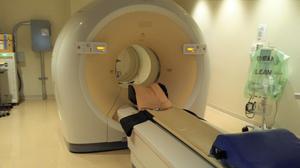Loading...
Found 25 Breast Cancer trials
A listing of Breast Cancer medical research trials actively recruiting patient volunteers. Search for closest city to find more detailed information on a research study in your area.
This study will evaluate whether olaparib is effective in breast cancer patients whose tumor has a mutation in one of the other genes that function with BRCA1 and BRCA2 to repair damaged DNA.

Women treated for primary breast cancer who undergo breast conservation therapy face an increased risk of developing a second breast cancer in the ipsilateral and the contralateral breast. Although mammographic screening is recommended annually, the sensitivity of mammography is limited in these patients due to the post treatment changes from …

Glioblastoma (GBM) is the most common primary malignant brain tumor in adults and is near uniformly fatal. Only three treatments have been approved by the US FDA for GBM in the past 2 decades: temozolomide, bevacizumab, and, most recently, tumor-treating fields (TTFields). TTFields represents a novel anti-cancer modality that creates …

Patients with recurrent or metastatic ER+ breast cancer, who have failed prior endocrine therapy may be eligible for this study. Patients may participate in this study, if they are at least 18 years of age, most participants will be receiving care at the clinical practices of the University of Pennsylvania. …

The main purpose of this study is to: 1) determine the feasibility of giving hydroxychloroquine, everolimus or the combination to people with disseminated tumor cells detected in their bone marrow. 2) determine how tolerable these drugs are in people who have completed treatment for breast cancer. 3) determine how well …
LOXO-292 is a highly potent and specific inhibitor of the RET RTK, with minimal inhibition of other kinase and non-kinase targets, and therefore may be of benefit to patients with tumors (such as NSCLC, MTC, PTC, and colon or breast carcinomas) that harbor RET alterations and/or depend on RET activation. …
![IMAGING OF IN VIVO SIGMA-2 RECEPTOR EXPRESSION WITH [18F]ISO-1 POSITRON EMISSION TOMOGRAPHY (PET/CT) IN METASTATIC BREAST CANCER](/media/img/trial_thumbnails/PET-CT_Scanner_2_1okELH6.jpg)
Patients with metastatic breast cancer, that is biopsy proven or clinically documented by standard imaging (e.g. CT, MRI, Bone Scan, Ultrasound, FDG PET/CT), may be eligible for this study. Patients may participate in this study, if they are at least 18 years of age. We anticipate enrolling up to 30 …

The main purpose of this research study is to learn whether the investigational combination of olaparib, palbociclib, and fulvestrant is safe in patients with estrogen receptor-positive (ER+) and/or progesterone receptor-positive (PR+) breast cancer and BRCA1 or BRCA2 mutations.
The purpose of this study is to compare any good and bad effects of using 2 years of the investigational drug Palbociclib in combination with standard anti-hormone therapy to using standard anti-hormone therapy alone and to evaluate the likelihood that invasive breast cancer returns.